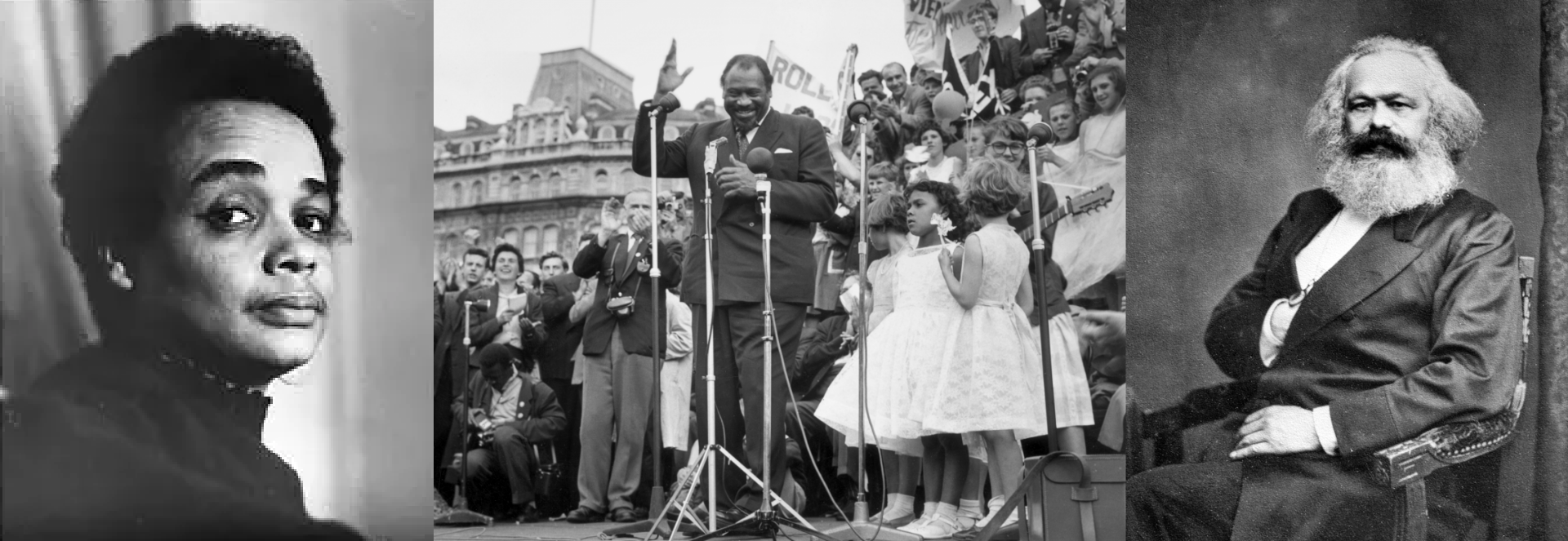Context – Critique of an interview given by Jim Haughton on 99.5 WBAI, September 1990.
Haughton said the main task was to be able to bring to bear sufficient pressure from the African-American community on Mayor Dinkins to counter the enormous pressure he faces from the powerful interests, that Dinkins wanted to do the right thing but couldn’t prevail against the entrenched interests unless the people organized a strong counter-force.
This is the old concept of American “pluralism,” the contending of a variety of competing interests in the political “marketplace,” with the winner that interest or those interests most successful in forging the strongest alliance or coalition. This is Government 101 at your nearest institution of “higher learning.”
Many NCIPA activists and leaders think in these terms. The idea is to “put pressure” on the politicians, to work out relationships with the more liberal political leaders, to get them to make concessions, to agree to some of what you want. Of course, realistic politics dictates that you can never get everything you want. And since nobody gives you anything for nothing, you incur a certain debt to the obliging politician. Quid pro quo is only fair. That is the marketplace idea again. You get something, you have to pay for it. And there is always tomorrow. You don’t win everything this time so you put it on the agenda for next year or next election. Of course, you have to work for the election or reelection of those who are prepared to “work with you,” since if the reactionary bastards get in, they will give you nothing. The important thing is to never burn your bridges to the liberals.
Of course, the liberal politicians, in turn, must also be realistic. They have to make deals with the more conservative or “moderate” politicians. They, too, must be prepared to give and take and not burn their bridges to the moderates on whom they depend to get some of what They want.
And, naturally, the moderates, too, must work out deals with the conservatives and ultra-reactionaries.
The point is that there is a chain of obligation that stretches to the most infamous elements of the ruling class — and that is what opportunist• politics is all about. It represents a statement that however we may differ and however we may struggle against one another we are still basically part of a viable and legitimate political system which, however imperfectly, still represents the best possible system that humanity has been able to work out. It represents the view that one achieves one’s goal through the process of
pressure and then negotiation, pressure and then negotiation — and everybody is welcome in this system, no matter how radical the rhetoric, so long as they abide by the rules of the game, so long as we agree that we are contending for different slices of the pie, that each of us of course would like a larger slice, but that we never challenge the existence of the pie itself.
Now among the people in NCIPA and many on the Left outside NCIPA, there is a sincere desire to see capitalism
replaced with some other system, some kind of socialism. There is a sincere opposition to imperialism. But there is also a deadly panic about cutting the cords which bind them to the more “reasonable” representatives of that system, to cut their ties with official liberalism. And it is absolutely impossible to practice independent politics without waging a war against liberalism. The attitude toward liberalism is the acid test .of independent politics and whether or not one’s politics can be characterized as progressive. Liberals are not progressive and those who trail behind liberalism are not progressive.
And Jim’s notion which he puts out in public (and doesn’t believe for a moment in private) that officials are independent or neutral entities that are simply blown about by the political winds and that our job is to apply the greatest gusts is simply contributing to the illusions in this system and disorienting the people. What must be shown, on the contrary, are the thousands of tentacles that fasten politicians to the system, to the status quo, to the propertied interests. what must be shown is the system of politics, the organically harmonious nature of the political institutions, the division of labor which promotes competition and struggle in a way that
shores up rather than threatens or even challenges the system.
Yes, commitment to radical social change is
indispensable. But I would rather begin working with someone who though perhaps still frightened of the word “socialism,” is nevertheless prepared to confront the system than to work with someone who pays lip service to socialism or communism or whatever and is thoroughly opportunist in their conception of tactics. And the thing about such people is that although the specifics of their tactic changes with each change in the objective situation, the vast majority of them never learn from their defeats but simply find new rationales for pursuing the same opportunism in the new circumstances.





